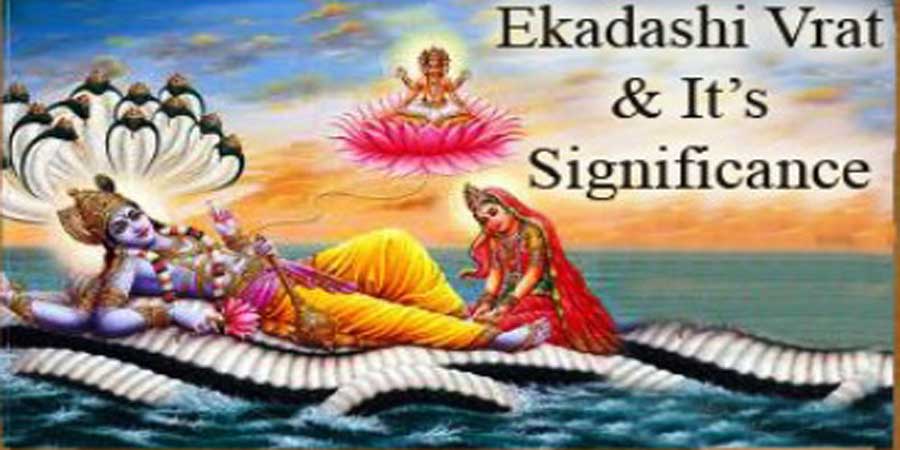Ekadashi Vrat

According to various Puranas, Ekadashi Tithi is considered auspicious and Lord Vishnu is worshiped on this day. It is also known as ‘Harivasara’ and ‘Hari din.’ Several Puranas including Padma Purana and Skanda Purana detail about the significance of Ekadashi.
On this day, devotees wake up early in the morning, take a ritual bath, worship the God and take a vow for the fast. Each Hindu lunar month consists of two Ekadashi tithis – One is in Krishna paksha (Dark Fortnight) and another in Shukla paksha (Bright Fortnight). It falls on the 11th day of every lunar fortnight.
Ekadashi is of two types, i.e, Vidya Ekadashi and Shudh Ekadashi. When Ekadashi conjucts Dashmi during sunrise, it is called Vidya Ekadashi. On the other hand, Ekadashi which do not conjucts Dashmi it is called Shudh Ekadashi. According to the Hindu scriptures, observing fast on Ekadashi conjucting Dashmi is prohibited. On the other hand, Shuddh Ekadashi fast can be observed, if it is conjucting Dwadashi even for a few minutes.
Nirjala Ekadashi of Jyeshtha Shukla Paksha is also known as Bhimseni Ekadashi as according to Rishi Vedvyas, this Ekadashi was held by Bhimsen. By observing this fast, a person gets longevity and salvation. It is considered to be one of the toughest fast as no water is drunk while observing this fast. Hence it is given the name of Nirjala Ekadashi i.e. Ekadashi fast without water. Observing fast on this Nirjala Ekadashi gives the results equivalent to observing 24 Ekadashis of a year. After observing this fast, a person should wake up early in the morning on Dwadashi (a day after Ekadashi), take bath, make a donation and offer food to Brahmins.
When to start Ekadasi Fasting?
Ekadasi is the name of the Goddess that arose from Lord Vishnu to defeat Demon Mura. Happy with her divine act, Lord Vishnu blessed her that anyone who observes Ekadasi fast will be freed of their sins and will attain Moksha. Lord Krishna advices Arjuna to begin the Ekadasi fasting in the autumn season with Utpanna or Uttpatti Ekadasi occurring during the waning phase of the moon in November – December.
Prayers for Ekadashi: The devotee must chant
Sri Vishnu Moola Mantra: “Om Namo Bhagwate Vasudevay Namah”
श्री विष्णु मूल मंत्र : “ॐ नमो भगवते वासुदेवाय नमः”
and recite Vishnu Sahasranamam or any prayers dedicated to Lord Vishnu or Sri Krishna. Apart from this he/she can donate cow, clothes, fruits etc. on this day.
Ekadashi Vrat Fasting Method:
There are a large number of people who observe it. And there are numerous clarifications on what food one can have. There are also regional variations to the way in which the Ekadashi is observed.
The preparation starts on Dashmi day – a day before Ekadashi. The person observing Ekadashi should wake up early in the morning on Dashmi day and should take bath and perform other daily routines. The person should mentally prepare for the Ekadashi. He/She should only have one meal on the Dashmi day and should avoid salt. Alcohol, non-vegetarian food and sex should be avoided. Some Puranas say ‘dal’ and ‘honey’ should be avoided on Dashmi day.
The next day, that is the Ekadashi day, is meant for total fasting. Praying to Lord Vishnu is the order of the day. Some people avoid sleep during Ekadashi night and they hear religious discourses and perform ‘Aarti.’ But many people today will not be able to stay awake the entire night due to work pressure etc.
The next day on Dwadashi – that is the day after Ekadashi – the same routine done on Dashami is followed. Overeating should be avoided on Dwadashi day. Puranas state that one should not take pride in observing Ekadashi. The food on Dwadashi should be cooked in one’s house.
It is good to go on fast once in a while as it recuperates the body. Ekadashi observance cleans our body and the digestive organs get much needed rest. Those people suffering from ailments and on medications should take the advice of a doctor before fasting. Never torture your body in the name of religion. There is nothing wrong in having fruits or milk. And you can bring a certain amount of flexibility in the way it is observed.
Ekadashi Food:
It is believed that demon Mura found a dwelling place in the rice and Lord Vishnu appeared in the form of Ekadashi to annihilate Mura. Therefore devotees who fast on the Ekadashi day avoid food made from grains.
Many devotees due to several reasons – like health and job commitments – observe partial fast on the day. Such people avoid non-vegetarian and food items made from beans, pulses and grains, especially rice. The most preferred Ekadashi fasting food in western parts of India is Sabudana Khichadi with potatoes and ground nut – but no onion and garlic.
The food that can be consumed on the Ekadashi day includes fresh and dried fruits, milk products, vegetables and nuts. So the golden rule is avoid pulses and grains on Ekadashi. Drink lots of water and eat fresh and dried fruits.In Hinduism, Upvaas is meant to bring a person close to Brahmins. So forget about the rules and regulations and what you are going to gain from the Ekadashi fast. Spend the day in purifying the mind and body and got rid of all your sins.
